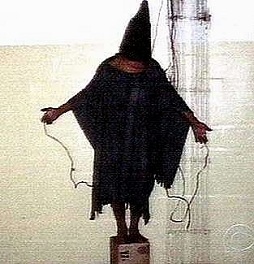Torture: Benighted Americans
Steve Hendricks
HNN

Seventy percent of Americans believe we should commit crimes against humanity. Not that they would put it that way. They would say something like, in the words of a Pew poll from some months ago, that torturing suspected terrorists is “often justified” (19 percent), “sometimes justified” (35 percent), or “rarely justified” (16 percent). That such beliefs persist, in such numbers, after years of talk about torture, signifies a moral chasm almost too depressing to contemplate.
If hope remains for spanning that chasm, it lies in the possibility—I would even argue the probability—that the better part of those 70 percent are not barbarous, merely benighted. To maintain such hope, it helps to have faith in American ignorance. Mine is pure. I derive immense comfort, for example, from the similarity between the pro-torture 70 percent and the 68 percent of Americans who believe “angels and demons are active in the world.” Surely many of my pro-torture countrymen just need a little more education about torture. Well, a lot more.
There is ample reason to believe they aren’t getting enough to make a difference. As other commentators have described, our educators on such affairs—reporters, editors, producers—have failed us abysmally. They have deferred grossly to hawks (including torture hawks), have dismissed doves as frivolous, have soft-pedaled the worst of tortures as “enhanced interrogation techniques,” have only rarely told us that to torture (or to send captives elsewhere to be tortured, as we still do) is to violate the UN Convention Against Torture (which the United States has adopted as law), and have told us even more rarely that international law regards systematic torture as a crime akin to those for which we executed Nazis at Nuremberg.
I would add one important failing to this list—one almost never discussed, as I found in four years of working on my new book about extraordinary rendition and torture, A Kidnapping in Milan: The CIA on Trial. To wit: the media almost never describe torture in all its savage detail. They abbreviate, elide, or wholly omit the gruesome specifics that many people need if they are to understand the horror that is torture. The media censor this, they tell us, because to do otherwise would be too disturbing. Evide ntly they do not consider that we should be disturbed.



























